Related Research Articles

The European Free Trade Association (EFTA) is a regional trade organization and free trade area consisting of four European states: Iceland, Liechtenstein, Norway and Switzerland. The organization operates in parallel with the European Union (EU), and all four member states participate in the European Single Market and are part of the Schengen Area. They are not, however, party to the European Union Customs Union.
A European Union Association Agreement or simply Association Agreement (AA) is a treaty between the European Union (EU), its Member States and a non-EU country that creates a framework for co-operation between them. Areas frequently covered by such agreements include the development of political, trade, social, cultural and security links.
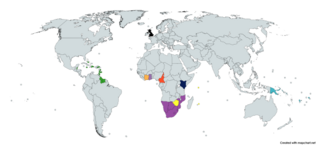
Economic Partnership Agreements (EPAs) are a scheme to create a free trade area (FTA) between the European Union and other countries. They are a response to continuing criticism that the non-reciprocal and discriminating preferential trade agreements offered by the EU are incompatible with WTO rules. The EPAs date back to the signing of the Cotonou Agreement. The EPAs with the different regions are at different states of play. The EU has signed EPAs with the following countries: the Southern African Development Community (SADC), ECOWAS, six countries in Eastern and Southern Africa, Cameroon, four Pacific states, and the CARIFORUM states. Their defining characteristic is that they open up exports to the EU immediately, while exports to the partner regions is opened up only partially and over transitioning periods.

Being part of the Kingdom of Denmark, the foreign relations of Faroe Islands are handled in cooperation with the Danish government and Government of Faroe Islands.
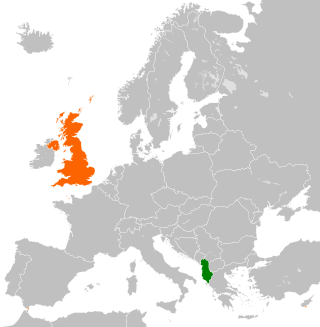
Albania–United Kingdom relations are the bilateral relations between Albania and the United Kingdom. Albania has an embassy in London, and the United Kingdom has an embassy in Tirana.
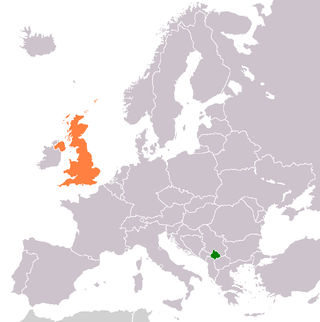
Kosovo–United Kingdom relations are foreign relations between the Republic of Kosovo and the United Kingdom of Great Britain and Northern Ireland. When Kosovo declared its independence from Serbia on 17 February 2008, the United Kingdom became one of the first countries to announce the official recognition of a sovereign Kosovo on 18 February 2008. The United Kingdom has had an embassy in Pristina since 5 March 2008. Kosovo has had an embassy in London since 1 October 2008. The two countries have very good and friendly relations.

Switzerland and the United Kingdom have enjoyed close bilateral historical relations for many decades, which continue to this day.

British–Chile relations are foreign relations between the United Kingdom and Chile. The two countries maintain strong cultural ties as Chilean culture was somewhat anglicised after independence, seeing many mutual investments since. Standard visits, on terms each country applies, allow visitors and short-term study, without need for a travel visa endorsed in a passport.
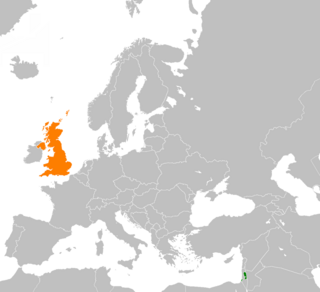
The United Kingdom does not recognise Palestine as a state. The UK has a non-accredited Consulate General in Jerusalem that "represents the UK government in Jerusalem, West Bank, and Gaza", and works on "political, commercial, security and economic interests between the UK and the Palestinian territories". Husam Zomlot became head of the Palestine Mission to the United Kingdom in 2018. The State of Palestine was represented in London by Manuel Hassassian, the Palestinian General Delegate to the United Kingdom between 2005 and 2018. Another former Palestinian General Delegate to the UK was Afif Safieh, who began in that role in 1990.

The relationship between the Republic of Korea and the United Kingdom of Great Britain and Northern Ireland spans from the 19th century to the present day. Although the Republic of Korea gives 18 January 1949 as the date of the establishment of formal relations with the United Kingdom, diplomatic ties go back to the United Kingdom–Korea Treaty of 1883. British military participation in the Korean War during the 1950s was significant, but relations between the two countries at the time were described as "tenuous", with relatively little known about each other. Commercial and trade relationships grew rapidly during the 1970s. During the Asian Financial Crisis in the late 1990s, Queen Elizabeth II made a state visit to South Korea, which was well received at a time of crisis in the country. Today, there are strong economic and diplomatic links between the two countries.

The European Union has concluded free trade agreements (FTAs) and other agreements with a trade component with many countries worldwide and is negotiating with many others. The European Union negotiates free trade deals on behalf of all of its member states, as the member states have granted the EU has an "exclusive competence" to conclude trade agreements. Even so, member states' governments control every step of the process :

Following its withdrawal from the European Union on 31 January 2020, the United Kingdom began negotiations on several free trade agreements to remove or reduce tariff and non-tariff barriers to trade, both to establish new agreements and to replace previous EU trade agreements. Withdrawal ended 47 years of membership during which all its trading agreements were negotiated by the European Commission on behalf of the bloc. The UK did not actually withdraw from the European Single Market and the European Union Customs Union until 31 December 2020.

Antigua and Barbuda and the United Kingdom of Great Britain and Northern Ireland (UK) are related through a long common history spanning from 1632 for Antigua, and 1678 for the smaller sister-isle of Barbuda through until 1981 for the joint-state. Antigua was one of the oldest English settlements in the West Indies, and served as a British hub of regional administration for the surrounding Leeward Islands.

The free trade agreements of Israel represent Israel's cooperation in multinational trade pacts and participation in the global economy. Israel's first free trade agreement was signed in 1985 with the United States of America. Since then, Israel has signed 16 free trade agreements with 48 countries and economic blocks such as the European Union, the European Free Trade Association and Mercosur.

The Canada–United Kingdom free trade agreement (CUKFTA) is a proposed free trade agreement which began negotiations on 24 March 2022. The trade agreement will be the third FTA to cover Canada–UK trade, and will supersede the Canada–United Kingdom Trade Continuity Agreement, extending the deal to cover services and digital trade.

Botswana–United Kingdom relations are the current and historical relationships between the United Kingdom (UK) and the Republic of Botswana. The two nations established diplomatic ties upon Botswana's independence.

The Mexico–United Kingdom free trade agreement (MUKFTA) is a proposed free trade agreement which began negotiations on 20 May 2022. The trade agreement would be the third FTA to cover Mexico–UK trade, superseding the Mexico–UK Trade Continuity Agreement, extending the deal to cover financial, creative, digital, services and digital trade.
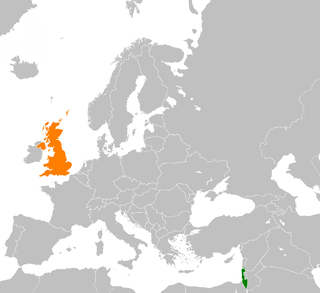
The Israel–United Kingdom free trade agreement (IUKFTA) is a proposed free trade agreement which began negotiations on 20 July 2022. The trade agreement would be the third FTA to cover Israel–UK trade, and superseding the Israel–UK Trade Continuity Agreement, extending the deal to cover services and digital trade. Trade value between Israel and the United Kingdom was worth £6,881 million in 2022.
Mozambique–United Kingdom relations are the current and historical relationships between the United Kingdom of Great Britain and Northern Ireland (UK) and the Republic of Mozambique. The two countries established diplomatic relations on 1 September 1975.
References
- ↑ Central America, European Commission
- ↑ "UK and Central America sign continuity agreement". GOV.UK. 18 July 2019. Archived from the original on 18 July 2019. Retrieved 24 December 2023. UK–Central America FTA
- ↑ "UK and Central America sign continuity agreement". Business Leader. 19 July 2019. Archived from the original on 9 August 2022. Retrieved 24 December 2023.
- ↑ "UK trade agreements in effect". GOV.UK. 3 November 2022. Archived from the original on 17 January 2024. Retrieved 9 February 2024.